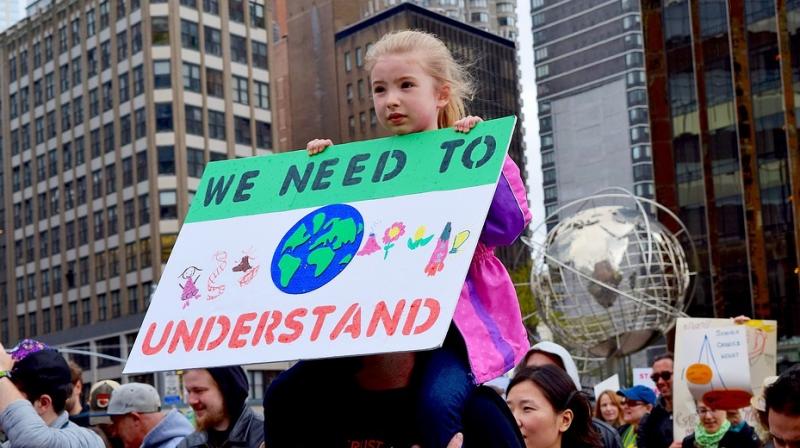Global wave of protest for acting on climate changes

Wellington: Hundreds gathered in Wellington carrying placards reading "Time's Melting Away" and "Act Now or Swim", part of a grassroots movement planning to stage 1,000 demonstrations in more than 100 countries on Friday. The international student strike is set to see classrooms empty in cities across the globe, from Boston to Bogota, Dhaka to Durban and Lagos to London.
"This is young people taking the reins and realising that they do have people power, that's really awesome," Abigail O'Regan, 20, told AFP. The protests were inspired by Swedish teen activist Greta Thunberg, who camped out in front of parliament in Stockholm last year to demand action from world leaders on global warming. "We are only seeing the beginning," tweeted Thunberg, who has been nominated for the Nobel Peace Prize for her activism.
"I think that change is on the horizon and the people will stand up for their future." Some teachers and political leaders have tried to cajole or threaten students -- efforts that have mostly backfired. In New Zealand, schools have warned absent students will be marked as truants, with Secondary Principals Association president Michael Williams saying their impact on climate change will be "probably zero". "We're concerned that students are wasting good learning time," he said.
But the budding activists have received encouragement from Prime Minster Jacinda Ardern, who said it was important for the young generation to send a message. "Don't underestimate the power of your voice," the 38-year-old leader told students at parliament this week. "Too often we make this assessment that to make an impact we have to be of voting age.
That is not the case." Wellington university student Josie Mason, 20, said she was "excited by the fact that youth are being heard and are making a stand right now." "They call our generation the 'slacktivists' because it's really easy to say you're going to an event on a Facebook page or like something but not really do anything," she said. Despite 30 years of warnings about dire impacts, carbon dioxide emissions hit record levels in 2017 and again last year.
Loading the atmosphere with greenhouse gases at current rates, scientists agree, will eventually lead to an unlivable planet. "On climate change, we have to acknowledge that we have failed," Thunberg told the global ruling class in Davos in January. The 2015 Paris climate treaty calls for capping global warming at "well below" two degrees Celsius.
The planet is currently on track to heat up by double that figure. The UN's climate science panel warned in October that only a wholesale transformation of the global economy and consumer habits could forestall climate catastrophe.
As she prepared to march through central Wellington to parliament, O'Regan said she was concerned that by the time she was raising a family the plant would be close to unlivable. "I feel a lot of stress and anxiety about the climate situation, and fear for my future," she said. "I have genuine fear that my future will not be what it should be."

